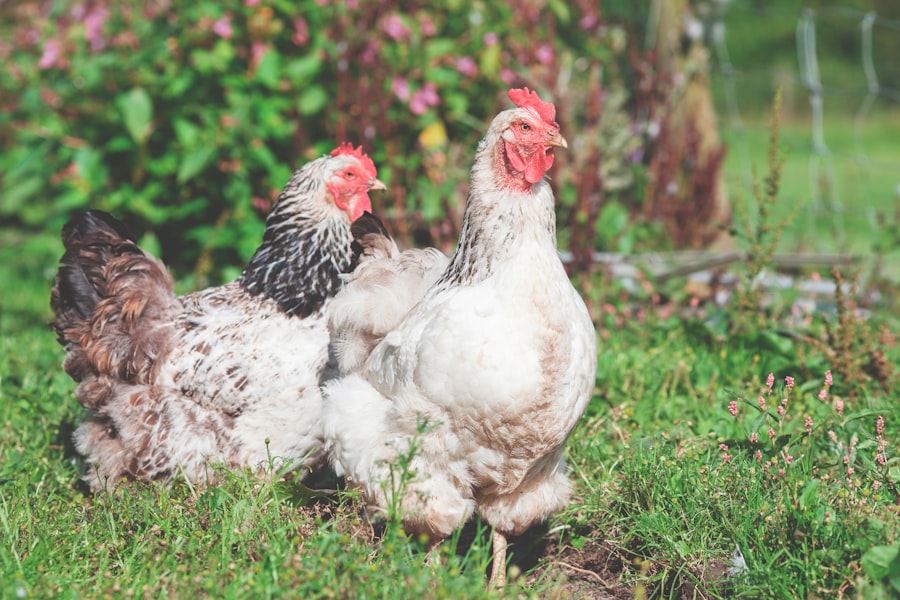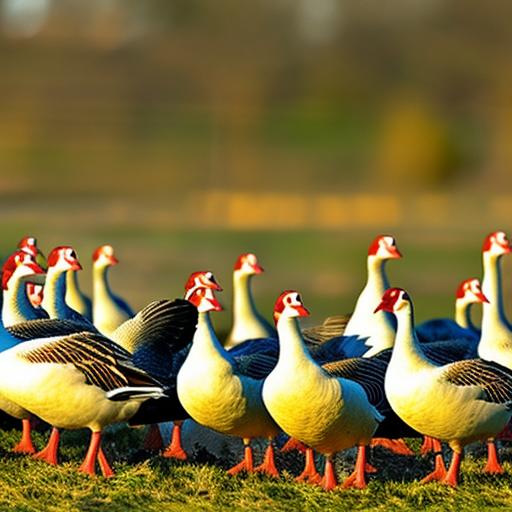Keeping geese and chickens together can be a rewarding experience for poultry enthusiasts. Not only do they provide pest control, egg production, and entertainment, but they also have their own unique challenges. In this article, we will explore the benefits and challenges of keeping geese and chickens together, as well as provide tips for successful coexistence.
One of the main benefits of keeping geese and chickens together is pest control. Geese are excellent at foraging and can help keep your yard or farm free from pests such as insects and weeds. They have a keen eye for spotting potential threats and will alert the flock with their loud honking. Chickens, on the other hand, are great at controlling smaller pests like ticks and fleas. They will scratch and peck at the ground, eating any insects they come across.
Another benefit of keeping geese and chickens together is egg production. Geese lay fewer eggs than chickens, but they lay for a longer period of time. Their eggs are larger and have a richer flavor compared to chicken eggs. Chickens, on the other hand, lay more eggs but for a shorter period of time. This means that by keeping both geese and chickens, you can have a steady supply of eggs throughout the year.
Lastly, keeping geese and chickens together can provide entertainment. Geese are known for their curious and playful nature. They will often chase each other around, honking loudly in excitement. Chickens, on the other hand, are social animals that enjoy interacting with their human caretakers. They can be easily tamed and make great pets for children.
However, there are also challenges that come with keeping geese and chickens together. One challenge is the different housing requirements. Geese require more space than chickens due to their larger size. They also need access to water for swimming, which can be a challenge if you don’t have a pond or a large enough water source. Chickens, on the other hand, need a secure coop to protect them from predators and the elements.
Another challenge is managing flock dynamics. Geese are larger and more aggressive than chickens, which can lead to conflicts within the flock. It’s important to introduce geese and chickens slowly and carefully, allowing them to get used to each other’s presence. It’s also important to provide enough space and resources for all birds to avoid competition.
Key Takeaways
- Keeping geese with chickens can provide benefits such as pest control and increased egg production, but also presents challenges in terms of compatibility and flock dynamics.
- Geese and chickens have different behaviors and needs, so it’s important to understand their differences before introducing them to the same flock.
- Choosing the right breeds is crucial for successful coexistence, as some geese and chicken breeds are more compatible than others.
- Proper housing and feeding are essential for the health and well-being of both geese and chickens, and can also help prevent conflicts within the flock.
- Socialization and management techniques can help promote peaceful coexistence between geese and chickens, while also preventing aggression and bullying.
Understanding the Differences Between Geese and Chickens
Geese and chickens have their own unique characteristics and behaviors. Understanding these differences can help you better manage your flock and ensure their well-being.
Geese are larger and more aggressive than chickens. They can grow up to 30 pounds or more, depending on the breed. Their size and strength make them excellent guard animals, as they can deter potential predators with their loud honking and aggressive behavior. However, their size also means that they require more space and resources compared to chickens.
Chickens, on the other hand, are smaller and more social animals. They are easier to handle and can be tamed with proper care and handling. Chickens are known for their flocking behavior and enjoy being in the company of other chickens. They are also more docile compared to geese, making them easier to integrate into a mixed flock.
Choosing the Right Breeds for Your Flock: Geese and Chickens Compatibility
When choosing breeds for your mixed flock of geese and chickens, it’s important to consider their compatibility. Some breeds of geese and chickens are more compatible than others, based on factors such as size, temperament, and egg-laying habits.
For geese, breeds such as Toulouse, Embden, or Chinese geese are good choices for mixed flocks. These breeds are known for their calm and docile temperament, making them easier to integrate with chickens. They are also good egg layers, producing a decent number of eggs throughout the year.
For chickens, breeds such as Rhode Island Reds, Sussex, or Orpingtons are good choices for mixed flocks. These breeds are known for their friendly and sociable nature, making them more compatible with geese. They are also good egg layers, producing a consistent supply of eggs.
It’s important to avoid mixing aggressive breeds with docile ones. Aggressive breeds can cause harm to other birds in the flock, leading to injuries or even death. It’s also important to consider the size of the breeds when mixing geese and chickens. Geese are much larger than chickens and may unintentionally harm smaller chicken breeds.
Housing and Feeding Requirements for Geese and Chickens
Geese and chickens have different housing and feeding requirements that need to be taken into consideration when keeping them together.
Geese require more space compared to chickens due to their larger size. They need enough space to roam and graze, as well as access to water for swimming. If you don’t have a pond or a large enough water source, you can provide a kiddie pool or a shallow tub for them to swim in. It’s important to keep the water clean and fresh to prevent any health issues.
Chickens, on the other hand, need a secure coop to protect them from predators and the elements. The coop should be well-ventilated and provide enough space for the number of chickens you have. It should also have nesting boxes for egg-laying and perches for roosting. The coop should be cleaned regularly to prevent the buildup of waste and parasites.
In terms of feeding, geese and chickens have different dietary needs. Geese are grazers and require access to fresh grass or pasture. They also need a balanced diet of grains and protein to meet their nutritional needs. Chickens, on the other hand, require a balanced diet of grains, protein, and calcium for egg production. They can be fed a commercial chicken feed or a mixture of grains and kitchen scraps.
Managing Flock Dynamics: Geese and Chickens Socialization
Managing flock dynamics is crucial when keeping geese and chickens together. Introducing geese and chickens slowly and carefully is important to prevent conflicts within the flock.
When introducing geese and chickens, it’s best to start with younger birds that are more adaptable to new surroundings. This allows them to grow up together and establish a pecking order. It’s also important to provide enough space and resources for all birds to avoid competition. This includes providing multiple feeding and watering stations, as well as enough space for each bird to roam.
Monitoring flock dynamics is important to ensure the well-being of all birds. If you notice any aggressive behavior or bullying within the flock, it’s important to intervene and separate the birds if necessary. This can be done by providing temporary fencing or using dividers within the coop or run. It’s also important to provide enough hiding spots or perches for birds to escape from aggressive individuals.
Health and Disease Prevention for Geese and Chickens

Keeping your geese and chickens healthy is essential for their overall well-being. Regular veterinary care, vaccinations, and proper hygiene practices are important in preventing diseases.
Keeping the coop and surrounding area clean and dry is crucial in preventing the buildup of waste and parasites. Regularly remove droppings from the coop and replace bedding as needed. Provide clean water and food containers to prevent contamination.
Regular veterinary care is important in preventing diseases in your flock. Consult with a poultry veterinarian to develop a vaccination schedule for your geese and chickens. Vaccinations can help prevent common diseases such as avian influenza, Newcastle disease, and Marek’s disease.
Watch for signs of illness in your geese and chickens and isolate sick birds immediately. Common signs of illness include lethargy, loss of appetite, abnormal droppings, and respiratory symptoms. Consult with a poultry veterinarian if you notice any signs of illness in your flock.
Egg Production and Management: Geese and Chickens Laying Habits
Geese and chickens have different egg-laying habits that need to be taken into consideration when managing your flock.
Geese lay fewer eggs compared to chickens, but they lay for a longer period of time. Geese typically start laying eggs at around 2-3 years of age and can continue laying for up to 20 years. They lay an average of 20-40 eggs per year, depending on the breed. Geese also have a longer incubation period for their eggs, which is around 30 days.
Chickens, on the other hand, lay more eggs but for a shorter period of time. Most chicken breeds start laying eggs at around 5-6 months of age and can continue laying for up to 3-4 years. They lay an average of 200-300 eggs per year, depending on the breed. Chicken eggs have a shorter incubation period, which is around 21 days.
It’s important to provide nesting boxes for both geese and chickens to lay their eggs. Geese prefer to nest on the ground or in low nesting boxes, while chickens prefer elevated nesting boxes. It’s important to provide clean bedding in the nesting boxes and collect eggs regularly to prevent them from being damaged or eaten by other birds.
Predator Control and Security Measures for Geese and Chickens
Protecting your flock from predators is crucial in ensuring their safety and well-being. There are several security measures you can take to keep predators out.
Firstly, it’s important to use fencing or netting to create a secure perimeter around your coop and run. The fencing should be buried at least 12 inches deep to prevent predators from digging under it. It should also be tall enough to prevent predators from jumping over it. Use hardware cloth or welded wire mesh with small openings to prevent predators from squeezing through.
Secondly, it’s important to keep the coop and surrounding area well-lit and secure. Install motion-activated lights around the coop to deter nocturnal predators such as raccoons and foxes. Make sure all doors and windows are securely locked at night to prevent predators from gaining access.
Lastly, it’s important to be vigilant and monitor your flock for any signs of predator activity. Look for tracks, droppings, or signs of digging around the coop or run. If you notice any signs of predator activity, take immediate action to reinforce security measures and protect your flock.
Seasonal Considerations: Geese and Chickens Winter and Summer Care
Geese and chickens have different needs in different seasons, and it’s important to provide appropriate care to ensure their well-being.
In the winter, geese and chickens need shelter from the cold and protection from frostbite. Provide a well-insulated coop with plenty of bedding to keep them warm. You can also provide additional heat sources such as heat lamps or heated waterers. Make sure the coop is well-ventilated to prevent the buildup of moisture, which can lead to respiratory issues.
In the summer, geese and chickens need shade and plenty of water to stay cool. Provide shade structures or trees in the run or pasture area for them to seek shelter from the sun. Make sure they have access to fresh water at all times, as dehydration can be a serious issue in hot weather. You can also provide misters or shallow pools for them to cool off in.
Tips for Successful Geese and Chickens Coexistence
Keeping geese and chickens together can be a rewarding experience, but it also comes with its own challenges. Here are some tips for successful coexistence:
– Keep geese and chickens in separate areas if necessary. If you notice that the geese are being too aggressive towards the chickens, it may be best to keep them in separate enclosures.
– Provide enough space and resources for all birds. This includes providing enough space to roam, access to water for swimming, and multiple feeding and watering stations.
– Monitor flock dynamics and intervene if necessary. If you notice any aggressive behavior or bullying within the flock, separate the birds if necessary.
– Enjoy the benefits of keeping geese and chickens together! They provide pest control, egg production, and entertainment, making them a valuable addition to any poultry flock.
If you’re interested in keeping geese with chickens, you may also want to check out this helpful article on Poultry Wizard about the importance of having a proper floor for your chicken coop. A well-designed coop floor not only provides a comfortable and clean environment for your chickens but also ensures their safety and health. To learn more about creating the perfect coop floor, click here: https://poultrywizard.com/keeping-chickens/floor-of-chicken-coop/.
FAQs
What are the benefits of keeping geese with chickens?
Keeping geese with chickens can provide several benefits such as increased protection against predators, improved foraging, and better egg production.
What are the potential drawbacks of keeping geese with chickens?
One potential drawback of keeping geese with chickens is that geese can be aggressive towards chickens, especially during mating season. Additionally, geese require more space and water than chickens, which can be a challenge for some backyard farmers.
How do you introduce geese to a flock of chickens?
It is important to introduce geese to a flock of chickens slowly and carefully. Start by keeping the geese in a separate enclosure next to the chicken coop for a few days, allowing them to get used to each other’s presence. Then, gradually allow them to interact under supervision until they are comfortable with each other.
What should you feed geese and chickens when they are kept together?
Geese and chickens have different dietary needs, so it is important to provide them with separate feeders and waterers. Geese require a diet that is higher in protein and lower in calcium than chickens, so they should be fed a specialized waterfowl feed. Chickens can eat a standard layer feed.
How do you protect geese and chickens from predators?
To protect geese and chickens from predators, it is important to provide a secure coop and run that is covered with wire mesh to prevent entry from above and below. Additionally, it is important to lock the coop at night and provide adequate lighting to deter nocturnal predators.
Meet Walter, the feathered-friend fanatic of Florida! Nestled in the sunshine state, Walter struts through life with his feathered companions, clucking his way to happiness. With a coop that’s fancier than a five-star hotel, he’s the Don Juan of the chicken world. When he’s not teaching his hens to do the cha-cha, you’ll find him in a heated debate with his prized rooster, Sir Clucks-a-Lot. Walter’s poultry passion is no yolk; he’s the sunny-side-up guy you never knew you needed in your flock of friends!







